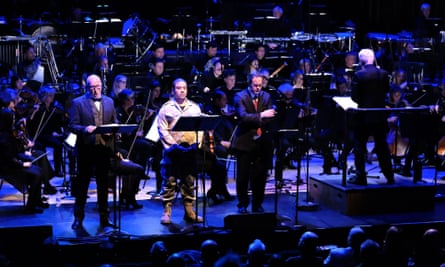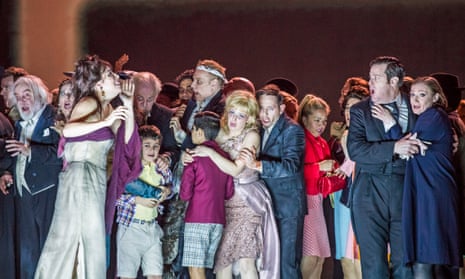On first encounter – at the world premiere in Salzburg last year – Thomas Adès’s The Exterminating Angel challenged ears and eyes simply to keep up, to absorb the panoply of sounds and sights: bells, sheep raw and cooked, lurking bear and large ensemble cast with broadly similar names (Lucía, Leticia, Leonora). Above all there was Adès’s variously noisy, subtle and voluptuous score coloured by ondes martenot, winnowing and bopping throughout, glassy string harmonics, thundering drum rolls, louche solo guitar, upstart rattles of castanets. I found it compelling. What would a second encounter reveal?
With the same (cameo roles aside) all-star, mainly British cast, the opera had its UK premiere at the Royal Opera House on Monday. It was as convincing as before, and also different. The countless musical jokes bristling through the piece – plenty of nods at anyone called Strauss – were funnier. The shifts between lyricism and manic adventure, though now anticipated, were more gripping in their tight control. Other aspects troubled which before had been absorbed: the high-note writing for the female voices, sonically offsetting the casts’s six baritone or bass baritones, at times felt excessive. Only the coloratura soprano Audrey Luna as the “opera singer” Lucia showed no signs of strain. She sang Ariel in Adès’s The Tempest and makes this stratospheric singing sound effortless, tiny high notes exploding like puffs of glitter.
Tom Cairns’s staging, with 1960s designs by Hildegard Bechtler set around a large, revolving arch, suits Covent Garden better than Salzburg’s Haus für Mozart, partly to do with better sightlines. Cairns also wrote the text, in collaboration with Adès, based on Buñuel’s surreal film El ángel exterminador (1962): guests at a high-society, post-opera dinner party find they cannot leave at the end of the evening. No explanation is given. They lose reason and dignity as catastrophe unfolds.
Despite the formidable challenges and some momentary ensemble lapses, singing, acting and orchestral playing, conducted by Adès, were impressive. The Royal Opera chorus excelled, both offstage and on. Ed Lyon and Sophie Bevan (Eduardo and Beatriz) made harrowing beauty of their duet, which unfurls in poignant, fateful melody. Amanda Echalaz, less at ease in the higher vocal extremes, was convincing as the elegant Lucía, maintaining her brittle hostess smile as her guests turn bestial, and attempting to snatch a kiss from her lover, the Colonel (David Adam Moore). As her husband, Charles Workman mustered a fine line in frozen bonhomie. Christine Rice shone as the melodious pianist wife of Roc, a conductor of the maestro variety (Thomas Allen). Her tender ballad Over the Sea was a showstopper. Countertenor Iestyn Davies as the hyper-needy Francisco and Sally Matthews as his glamorous sister, “a young widowed mother”, had a great Siegmund-Sieglinde kissing moment (this is an opera with everything). Anne Sofie von Otter beguiled as the ailing Leonora, addicted to various substances, including John Tomlinson’s Doctor with his ev-en-mea-sured-vo-cal-lines.
What do we expect from opera, old or new? Engrossing music, harmonic adventure, visual interest, drama, emotion, lyricism, boldness, variety, virtuosic performances, big choruses and, if we’re lucky, some humour. No opera is without its weaknesses, or elements you wish could be cut. This may be a matter of personal taste rather than any artistic shortcoming by the composer. You can include big names of the past there too. (You tell me your “never again thanks” big operas and I’ll tell you mine.) Adès pulls out every card he has and plays each with technical virtuosity, which has been his hallmark for more than 20 years. The Exterminating Angel, on second encounter, confirms itself as a grand endeavour written out of love for the form, generously achieved, wonderfully performed. That’s quite something.

This was a week of second encounters with the works of composer-conductors. John Adams’s Doctor Atomic (2005) had its UK premiere at English National Opera in 2009. As part of his 70th birthday celebrations with the BBC Symphony Orchestra and Singers, Adams took the baton for a one-off performance at the Barbican with Gerald Finley back in the title role he created, supported by an impeccable cast. The docu-opera, which in the theatre had more the feel of a cantata, worked almost better in this deft semi-staging (by Kenneth Richardson) in which modest props – a cigarette, a telephone, a letter – and distinctive clothing, such as khakis or a woman’s shawl, told us all we needed. Being able to see the BBCSO, on top form, added to our grasp of the layering and intricacies of Adams’s magnificent, terrifying score.
To a collage text drawn from original sources by Peter Sellars, Doctor Atomic examines the period of the Manhattan Project leading up to the Trinity test in the Alamogordo desert, and the detonation of the first atomic bomb. We witness the theoretical physicist J Robert Oppenheimer, the doctor of the title, at once pressing ahead with scientific discovery and wrestling with the moral doubts that would forever haunt him. Fellow scientists, the Hungarian Edward Teller (an inspiration for Dr Strangelove) and Robert Wilson – characterfully sung by Brindley Sherratt and Andrew Staples – express their differing anxieties. Dialogue is urgent and complex, offset by the expansive, impassioned outpourings of Kitty Oppenheimer and her Tewa Indian maid Pasqualita, sung in both instances with heartfelt grace by the soprano Julia Bullock and the mezzo-soprano Jennifer Johnston.
The roar of the final, shocking moments of this opera may, in this case literally, shake you. Yet it’s the sound of Gerald Finley, earlier, singing John Donne’s Batter My Heart, that confounds and disturbs. In one week, to hear two wildly different but equally powerful stage works by living composers is a reminder that there’s no such generic animal as “modern opera”.
Star ratings (out of 5)
The Exterminating Angel ★★★★★
Doctor Atomic ★★★★★
The Exterminating Angel is in rep at the Royal Opera House, London until 8 May, and will be broadcast on Radio 3 on 27 May, 6pm

Comments (…)
Sign in or create your Guardian account to join the discussion